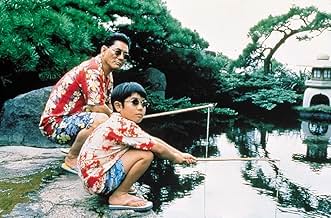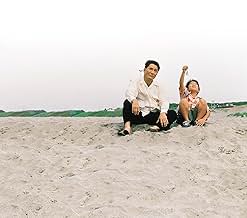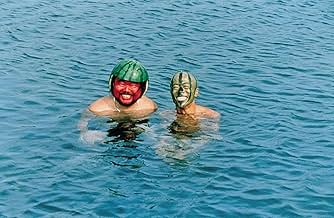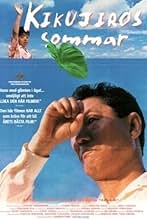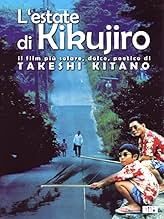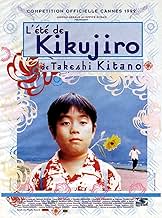IMDb-BEWERTUNG
7,7/10
22.674
IHRE BEWERTUNG
Ein naiver Junge macht sich alleine auf die Suche nach seiner eigensinnigen Mutter. Bald findet er in einem schrulligen Mann einen ungewöhnlichen Beschützer und die beiden erleben unterwegs ... Alles lesenEin naiver Junge macht sich alleine auf die Suche nach seiner eigensinnigen Mutter. Bald findet er in einem schrulligen Mann einen ungewöhnlichen Beschützer und die beiden erleben unterwegs eine Reihe von unerwarteten Abenteuern.Ein naiver Junge macht sich alleine auf die Suche nach seiner eigensinnigen Mutter. Bald findet er in einem schrulligen Mann einen ungewöhnlichen Beschützer und die beiden erleben unterwegs eine Reihe von unerwarteten Abenteuern.
- Auszeichnungen
- 4 Gewinne & 4 Nominierungen insgesamt
Takeshi Kitano
- Kikujiro
- (as Beat Takeshi)
The Great Gidayû
- Biker
- (as Gurêto Gidayû)
Beat Kiyoshi
- Man at Bus Stop
- (as Bîto Kiyoshi)
Yôji Tanaka
- Yakuza Henchman
- (as Yoji Tanaka)
Handlung
WUSSTEST DU SCHON:
- WissenswertesTakeshi Kitano made this gentler film as an antidote to his usual violent gangster movies.
- Crazy CreditsThere's one more scene after the credits.
- VerbindungenFeatured in Jam session - Kikujiro no natsu koshiki kaizokuban (1999)
- SoundtracksSummer
Written by Joe Hisaishi
Ausgewählte Rezension
In the title role of this highly original 1999 road movie, Beat Takeshi - with his twitching eye and bow-legged shuffle - looks and acts like a cross between Mickey Rourke and Harvey Keitel with a heavy dose of Walter Matthau's sourpuss demeanor (circa "The Bad News Bears") for good measure. He creates a truly memorable character - cynically profane, unapologetically insulting, childishly manipulative and somehow likable. As the director and screenwriter of said film, Takeshi Kitano - the same guy - has fashioned something quite unique from a tired premise - a boy's search for his mother and the gruff man who begrudgingly helps find her. What could have been a predictable and sentimental wallow, especially with the indiscriminate use of angels as a pervasive symbol, is instead an idiosyncratic, emotionally adroit film that sometimes simmers on the cusp of violence.
Yet it becomes ultimately affecting almost in spite of itself. In fact, Kitano does such a resolutely offbeat job that at certain times, the film reminds me of the narrative ellipses and low steady shots that were the trademark of Yasujiro Ozu's home dramas, intermingled with a surprisingly intense Quentin Tarantino-like, in-your-face edginess. The protagonist of the film is really the latch-key nine-year old, Masao, who is on a quest to find the mother whom his grandmother says is "away working". With his sad eyes and cherubic face, Yusuke Sekiguchi is perfectly cast as Masao providing the moral compass for the story. Whether he is running with his arms flailing or forlornly playing soccer by himself, he is poignant without being saccharine and completely natural. It is Masao's scrapbook that provides the framework for the film lending each chapter a descriptive title. Every chapter has a distinct character that is, in various turns, playful, hilarious, disturbing, surreal and heartbreaking. Case in point: Kitano is not afraid to use a child molester as first an uncomfortable source of black humor and then as the subject of Masao's nightmare. My favorite scenes come toward the end when Kikujiro organizes a motley crew of misfits to play games with Masao and have them masquerade as Indians, aliens, marine life and even watermelons. The variety in tone between chapters makes for unexpected tonal shifts, but somehow it works and adds to the greater context of the story.
That Kitano is able to manage a consistent film-making style with a strong visual sense is a credit to the talent behind the camera - not only Kitano's direction, script and film editing but also his artwork showcased throughout the movie, Katsumi Yanagishima's sharply rendered cinematography and Joe Hisaishi's evocative Windham Hill-like score. There are some funny sideline performances from Gidayu Great and Rakkyo Ide as Fatso and Baldy, two bikers who turn out to be the Abbott and Costello of soft-hearted slackers; Nezumi Mamura as a free-spirited drifter; Fumie Hosokawa as a relentlessly perky girl with a talent for juggling; and in the opening sequence, Kayoko Kishimoto as Kikujiro's take-no-prisoners wife. Kitano, however, elicits the most laughs if only for the film's central conceit that he gets away with his infantile gangster behavior. One would think the story would climax when Masao comes upon his mother, but Kitano confounds expectations with every new scene. The DVD really has no extras other than a couple of trailers not related to the film (not coincidentally, one is for Walter Salles' "Central Station" which has a similar story structure). I know this film has its detractors, especially among fans of Kitano's bloodier work, but I find it intriguingly ambiguous and thoroughly enjoyable.
Yet it becomes ultimately affecting almost in spite of itself. In fact, Kitano does such a resolutely offbeat job that at certain times, the film reminds me of the narrative ellipses and low steady shots that were the trademark of Yasujiro Ozu's home dramas, intermingled with a surprisingly intense Quentin Tarantino-like, in-your-face edginess. The protagonist of the film is really the latch-key nine-year old, Masao, who is on a quest to find the mother whom his grandmother says is "away working". With his sad eyes and cherubic face, Yusuke Sekiguchi is perfectly cast as Masao providing the moral compass for the story. Whether he is running with his arms flailing or forlornly playing soccer by himself, he is poignant without being saccharine and completely natural. It is Masao's scrapbook that provides the framework for the film lending each chapter a descriptive title. Every chapter has a distinct character that is, in various turns, playful, hilarious, disturbing, surreal and heartbreaking. Case in point: Kitano is not afraid to use a child molester as first an uncomfortable source of black humor and then as the subject of Masao's nightmare. My favorite scenes come toward the end when Kikujiro organizes a motley crew of misfits to play games with Masao and have them masquerade as Indians, aliens, marine life and even watermelons. The variety in tone between chapters makes for unexpected tonal shifts, but somehow it works and adds to the greater context of the story.
That Kitano is able to manage a consistent film-making style with a strong visual sense is a credit to the talent behind the camera - not only Kitano's direction, script and film editing but also his artwork showcased throughout the movie, Katsumi Yanagishima's sharply rendered cinematography and Joe Hisaishi's evocative Windham Hill-like score. There are some funny sideline performances from Gidayu Great and Rakkyo Ide as Fatso and Baldy, two bikers who turn out to be the Abbott and Costello of soft-hearted slackers; Nezumi Mamura as a free-spirited drifter; Fumie Hosokawa as a relentlessly perky girl with a talent for juggling; and in the opening sequence, Kayoko Kishimoto as Kikujiro's take-no-prisoners wife. Kitano, however, elicits the most laughs if only for the film's central conceit that he gets away with his infantile gangster behavior. One would think the story would climax when Masao comes upon his mother, but Kitano confounds expectations with every new scene. The DVD really has no extras other than a couple of trailers not related to the film (not coincidentally, one is for Walter Salles' "Central Station" which has a similar story structure). I know this film has its detractors, especially among fans of Kitano's bloodier work, but I find it intriguingly ambiguous and thoroughly enjoyable.
Top-Auswahl
Melde dich zum Bewerten an und greife auf die Watchlist für personalisierte Empfehlungen zu.
Details
- Erscheinungsdatum
- Herkunftsland
- Offizielle Standorte
- Sprache
- Auch bekannt als
- Kikujiro
- Drehorte
- Sensoji Temple, Asakusa, Taito, Tokio, Japan(Masao and his friend walk across the temple grounds)
- Produktionsfirmen
- Weitere beteiligte Unternehmen bei IMDbPro anzeigen
Box Office
- Bruttoertrag in den USA und Kanada
- 200.920 $
- Eröffnungswochenende in den USA und in Kanada
- 28.079 $
- 28. Mai 2000
- Weltweiter Bruttoertrag
- 281.527 $
- Laufzeit2 Stunden 2 Minuten
- Farbe
- Sound-Mix
- Seitenverhältnis
- 1.85 : 1
Zu dieser Seite beitragen
Bearbeitung vorschlagen oder fehlenden Inhalt hinzufügen

Oberste Lücke
By what name was Kikujiros Sommer (1999) officially released in Canada in French?
Antwort

